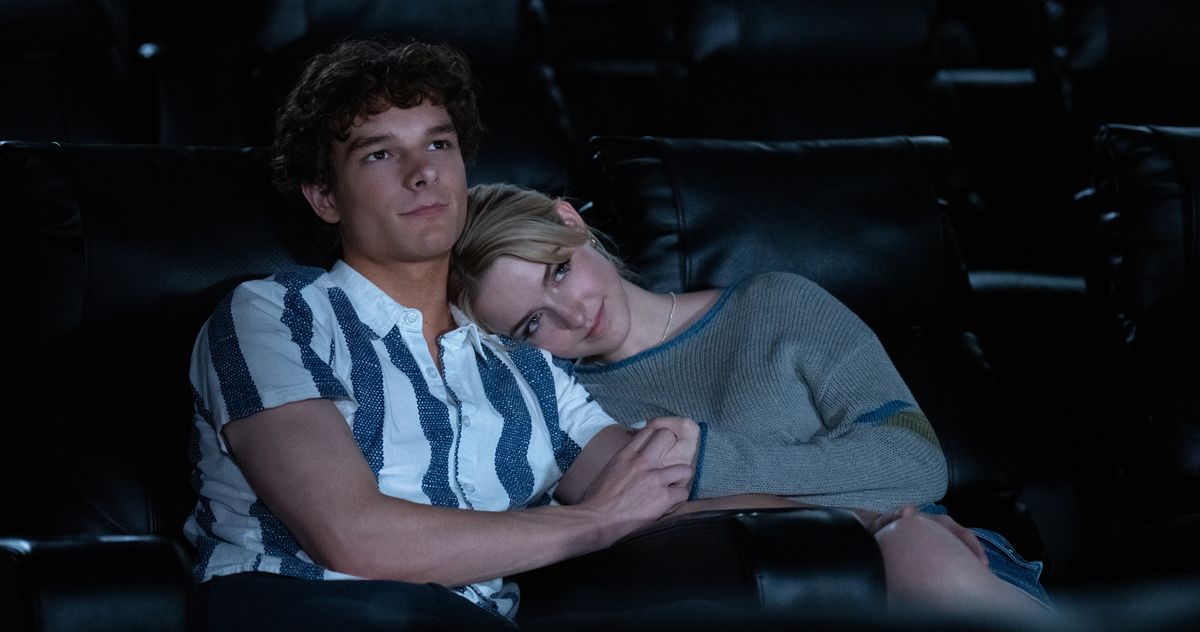
Photo: Paramount Pictures
I haven’t read any of Colleen Hoover’s work, so it’s entirely possible that her books are just as insane as the new film Regretting Youbased on her 2019 novel. But I’m tempted to credit this one to the filmmakers, as well as the cast — in particular, Allison Williams, who is quickly becoming our reigning deadpan queen of the absurd. When she conveys agitation, Williams has a uniquely hard stare that I’ve never really seen on any other actress: When she glares, her eyes seem fixed to a different axis than the rest of her face, so they appear to float in the air. It’s remarkable. It’s hilarious. It’s incredible. She doesn’t even have to emote that much, but she can turn anything into a comedy, and she knows it. (See also: M3gan.) She’s wonderful. Cast her in everything.
There are no great revelations in Regretting Youalthough the story unfolds like there are. The film opens sometime around 2006 (a radio helpfully informs us that the Killers have a new song out called “When You Were Young”) with a partying quartet of obviously mismatched teenagers: Morgan (Williams, de-aged like just about everyone else) is dating Chris (Scott Eastwood) while Jonah (Dave Franco) clearly longs for her, despite the fact that he is dating Jenny (Willa Fitzgerald), Morgan’s sister. Jonah and Morgan don’t like to drink, and they spend a lot of their time together, while Jenny and Chris are clearly highly compatible party fiends. Unfortunately, Morgan has just gotten pregnant, so her future with Chris is now set in stone. (This is, after all, fictional-romance-friendly small-town North Carolina, where everyone knows each other, hunks hitchhike on country roads, and teenage fates are inescapable.) The film then jumps forward 17 years: Morgan and Chris are still together, and the aforementioned impending fruit of their union, Clara (Mckenna Grace), is now a senior in high school. Jonah and Jenny have finally gotten married and have a newborn — it turns out their initial high-school romance was short-lived since Jonah mysteriously skipped town (hmmm, I wonder why) not long after that opening sequence, but now he’s back and they’re back together and they’ve got a kid and everything’s going super, only of course it isn’t.
Things go spiraling when Chris and Jenny suddenly die in a car accident (this is not a spoiler; it’s the inciting incident) and the daft duo of Morgan and Jonah discover that their spouses were having an affair. Of course, this should clear the way for them to finally do what they’ve always secretly longed for, but the film understandably takes its time getting there. There is, after all, some grieving to do. Except that there isn’t: The revelation of the affair results in the ordinarily predictable, reliable, always-there Morgan suddenly turning into a reality-TV-binging wine mom, slowly destroying the house she lives in, which was Chris’s childhood home — much to the consternation of Clara, who not only loved her father but also idolized her cool Aunt Jenny. In fact, Clara blames herself for the accident because when it occurred, she happened to be texting Jenny about her burgeoning romance with local stud Miller (Mason Thames, as ubiquitous as an MPAA rating nowadays) and thinks she distracted Jenny while driving. Little does Clara know that her beloved two-timing dad was driving Jenny’s car at the time. Anyway, the texting sequences in this film, with words popping up onscreen while the characters heatedly speak the dialogue in voice-over as their quiet physical selves calmly tap away on their phones, are amazing.
Despite my fondness for some of those old Nicholas Sparks movies, I admittedly may not be the intended audience for this film. My not-very-crowded opening-night audience applauded when Morgan and Jonah finally kissed (almost enough to drown out the loud snores of the guy several seats away from me), although their cheering did have a pro forma quality to it; it seemed to be part of the ritual. These stories don’t require any element of surprise; the appeal of this kind of romance is built on anticipation, on our expectation that people who are destined to be together will in fact get together.
There’s a perfectly good melodrama to be made from the plot of Regretting Youwhich on its surface isn’t so much a twisty-turny soap opera as it is a multicharacter wallow in uncontrolled emotions. It’s how this specific movie presents all the wallowing that made me feel like I was hallucinating. To go with Williams’s turbo-loaded deadpan, Franco’s relentlessly dry delivery adds another layer of weirdness, giving his dialogue a droning quality. Both actors seem to be fighting against the overt emotionality of the material by tamping everything down — internalizing, as film actors are supposed to do. It doesn’t work, but it really doesn’t work when set against Grace’s performance as Clara, which clears the knobs on the emotionality meter.
It’s hard to tell just how much of the humor in this film is intentional. Perhaps the idea is to show how awkward things can happen in the midst of unspeakable sadness (I am reminded of the heartbreaking little moment in Manchester by the Sea when a gurney carrying one of the protagonist’s dead kids hits a little bump on its way to the ambulance), but here it all feels so choreographed, so telegraphed, that abject lunacy ensues. It’s not hard to grasp on an intellectual level that Clara’s fervor is meant to contrast with Jonah and Morgan’s evident coldness. But this requires a deft directorial hand — otherwise, we feel like we’re lost in the mind of someone who doesn’t understand people, or emotions, or the world. Director Josh Boone will cut to a goofy montage right after a moment when a character is supposed to be mired in anguish. He’ll shoot an emotional climax in an AMC lobby (Miller, an aspiring film student, works at the local multiplex) and make sure to light it like an AMC commercial, bland and flat but somehow still harsh. Characters speak in one-liners at funerals. Clancy Brown shows up as Miller’s dying jokester grandfather. Are the filmmakers trying to undercut the drama, or do they just not know what they’re doing? Then again, I’m probably overthinking it. My audience didn’t just cheer for the make-out sessions, they also laughed in all the right (ie, wrong) places. They wanted a good time, and they got it.
See All

اترك تعليقاً